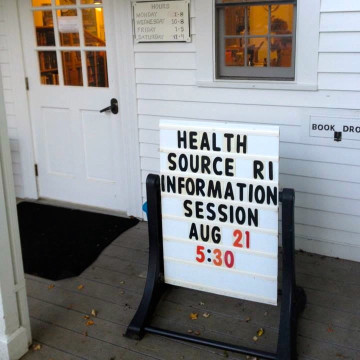Lisa Blais: Who Will Actually Benefit From RI’s Health Exchange?
Thursday, September 12, 2013
The young demographic is pivotal to the success of Obamacare, or so it would seem. The presumption is that younger people are healthy and require little more than preventative medical care. Young healthy adults are perceived as the group that will offset the costs of covering people with higher medical utilization, presumably much older people who seek extensive medical care. Youngin’s to the rescue? They are the key target demographic intended to keep the system financially afloat. Therefore the Obama Administration has been running an organizing campaign of sorts to urge the younger demographic to purchase health insurance through the insurance Exchanges because the insurance premiums will be based upon age and so, the younger you are the least costly the insurance premium will be.
Up close: who pays, who benefits?
But let’s look a little closer. The older, healthy folks, many who also only seek preventative medical care are also being leaned on to fund Obamacare. So are the small business groups. How so? Premiums for insurance purchased through the Exchanges will be based on age regardless of the level of utilization of medical care. So, it does not matter if you are in your 50’s with an excellent medical track record. You will pay more for insurance.
Of course, there are multiple cost-drivers that contribute to health insurance premiums that go beyond the age of subscribers. Additionally, there are also multiple taxes and fees that will be passed on in insurance premiums as a result of Obamacare. But for the purpose of this “look-see” it is worth noting that in the littlest state in the union we find inconsistencies among charges for health insurance from the same provider offering the same plan in at least two different venues. That’s nothing new in RI but noteworthy information given that RI’s health insurance exchange, HealthSourceRI, is slated to go live with their call center on or about the 16th of September to answer questions from the public. Consumers and small business owners will begin to make comparisons, and in the process may discover price differentials that may not provide coverage that is more affordable or at least less costly than their current or renewing insurance rates given that affordability is relative.
GET THE LATEST BREAKING NEWS HERE -- SIGN UP FOR GOLOCAL FREE DAILY EBLASTWhat's being offered, and to whom?
HealthSourceRI offers plans for small groups (small business with less than 50 employees) and plans for individuals to purchase insurance outside of a group plan. They categorize the variety of small business plans and plan designs by richness of benefit: Platinum, Gold, Silver and Bronze.
We compared the cost of Blue Cross Blue Shield plan “VantageBlue” for small businesses, with 100% coverage in-network (less requisite co-pays and deductable), a $2000.00 individual deductable and $4000.00 family deductable, provided for an employee (age 58) and spouse (age 55) through the Rhode Island Builders Association (enrollment period of November, 2013 with benefits based upon a calendar year of 2014 with utilization for only preventative care) with the same insurer and plan offered through HealthSourceRI.
Here’s what we found. Blue’s “VantageBlue” is considered a Gold plan in the scheme of things at HealthSourceRI. There is no longer a combined rate but rather the insurance is individually priced by age. The 58 year old will pay $753.00 per month while the 55 year old will be charged $659.00 per month for a total monthly premium of $1412.00 for coverage in 2014. Purchasing the same coverage for the same 58 and 55 year old couple through Rhode Island Builders Association will cost $1236 and change per month. That is $176.00 per month less than the cost to purchase insurance through HealthSourceRI and over $2000.00 less per year.
So what's changed?
Indeed, older, healthy people who only utilize the healthcare system for preventative care – just like those younger people who are needed to keep the Exchanges afloat – are subsidizing the ever escalating costs of health insurance and the proof is in the pudding as measured by the age-based system used in Obamacare Exchanges. So are the small businesses that employ folks whose demographics do not fall squarely in the very young age groups.
The “winners” in Obamacare will be individuals who are eligible for federal tax credits that will be applied against the monthly premium charged by the insurers. Tax credit eligibility is dependent upon certain income parameters. If someone is eligible for tax credits then the feds pay the insurer the difference between the tax credit and the actual premium. The individual pays the lesser amount to the insurer. All good? Well, for the recipient who is subsidized by the taxpayers it is! Following this to its natural conclusion, only leads us back to the problem at hand of health insurance – the rates keep going up while the benefits go down and those youngins’, small businesses and all taxpayers will continue to see rates rise.
Lisa Blais is a board member of OSTPA, a taxpayer advocacy organization in Rhode Island.
Related Articles
- Lisa Blais: RI’s Economic Assault On Average Taxpayers
- Lisa Blais: Awakening The Sleeping Giant in Coventry & Elsewhere
- Lisa Blais: Rhode Island School Choice A Travesty
- Lisa Blais: Education Is Rhode Island’s Political Football
- Lisa Blais: The Governor’s Executive Order and Your Wallet
- Lisa Blais: Money Flows To Campaigns + Cuts Off Kids
- Lisa Blais: The Struggle To Retain Seniority For Teachers
- Lisa Blais: No Public-Private Deals For Superman Building
- PowerPlayer: Tea Party Leader Lisa Blais
- Lisa Blais: Providence Goes After Water, Homeowners To Fix Budget
- Lisa Blais: RI Needs to Oppose Binding Arbitration Bill
- Lisa Blais: RI’s Budget—State Pension, Tolls + The Big Win




